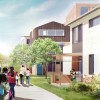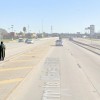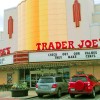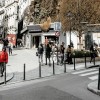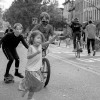How stay-at-home orders added to the homelife stress of many Houstonians
URBAN EDGE : March 29, 2021
COVID-19 has disproportionately impacted the lives of low-income families living in homes that were in need of repairs even before the pandemic. A pilot study involving 16 Fifth Ward households was launched to better understand how stay-at-home stress affected underserved residents both during and after the “Stay Home, Work Safe” order in Harris County.
45% of Houston families couldn’t make ends meet — then COVID-19 made things worse
URBAN EDGE : March 25, 2021
A new report shows most local economies aren’t delivering enough high-quality jobs to support the cost of raising a family. As cities across the nation work to recover from a recession that has worsened the preexisting challenge of struggling families, how can more jobs be created or upgraded to pay a family-sustaining wage?
America needs more police — just a different kind
URBAN EDGE : March 22, 2021
In the 10 months since the killing of George Floyd, has policing in America changed at all? We need to rethink what it means to protect and serve the well-being of citizens.
Giving Buffalo Bayou ‘back to the people’ of the East End
URBAN EDGE : March 17, 2021
As the Buffalo Bayou Partnership looks east, some of the first improvements planned include mixed-income housing options, a Japhet Creek pocket park in the lower Fifth Ward, wharf and dock reconstruction in the Second Ward and filling gaps in existing trails. But it all started with connecting to communities.
One year in, what progress has Houston made in its plan to build resilience?
URBAN EDGE : March 1, 2021
In 2020, the City of Houston and regional stakeholders cemented a resilience strategy and a climate action plan, which were adapted to reflect COVID-19’s impact on urban life. The Kinder Institute has gathered information and updates on the progress made in the first year of these efforts in one place.
Now that failing infrastructure has our attention, it needs our investment
URBAN EDGE : February 19, 2021
There’s no question the United States is living off past investments in infrastructure without building the new infrastructure we need — or even upgrading the old infrastructure we have. It’s time to invest heavily in quasi-public infrastructure and ramp up effective public oversight of that infrastructure so it will work for us in emergency situations.
Mapping inequity in Houston’s COVID-19 vaccination rollout
URBAN EDGE : February 14, 2021
Like many resources in Houston, access to the COVID-19 vaccine is concentrated on the west side of the city, while the greatest need and impact of the disease is concentrated among the residents on the east side.
Shedding light on the invisible epidemic of pedestrian deaths in America
URBAN EDGE : February 3, 2021
In the past 10 years, the number of people who have died while walking in the United States has shot up by more than 50%. In Houston, pedestrian deaths have more than doubled in that time — spiking 125%. In “Right of Way,” Angie Schmitt examines the crisis of pedestrian injuries and fatalities across the U.S. — a crisis that disproportionately impacts low-income and minority communities.
5 lessons Trader Joe’s can teach the city of the future
URBAN EDGE : January 24, 2021
Making the cities of tomorrow more resilient to pandemics and other threats won’t require completely rethinking planning and design as we know them, but it will require functional problem-solving, practical solutions, better data mining and analysis, and more flexibility. All of which have helped the beloved grocery store chain improve its bottom line during the COVID-19 pandemic.
How Houston can become a 15-minute city
URBAN EDGE : January 14, 2021
What does cancer treatment have to do with fighting climate change, the COVID-19 pandemic and neighborhood-level urban planning? Taking preventive steps today can literally save us all tomorrow.
Unflashy but effective ways to slow traffic and save lives
URBAN EDGE : January 7, 2021
Pedestrians and bicyclists accounted for 38% of all roadway deaths in Houston in 2019 — a 3% increase from 2018. Overall, 647 people were killed in fatal crashes in the Houston area in 2019, according to NHTSA data released in December. Prioritizing speed on local roads is the dangerous status quo in the U.S., but many cities are taking action to try and make safety the priority.
How will COVID-19 alter today’s house of tomorrow?
URBAN EDGE : January 3, 2021
In 2020, many American companies and their employees embraced working from home, and polls show the majority of workers want to continue the arrangement after the pandemic is over. With so many spending much more time at home, what design trends will benefit workers, households and individuals the most?




